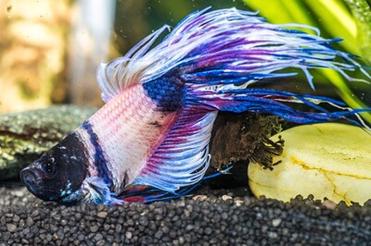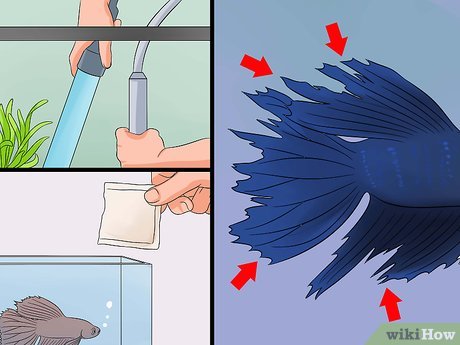As pet owners, we form a special bond with our furry and finned friends. Our pets become a part of our family, and their well-being is of utmost importance. It can be especially heartbreaking to watch a beloved betta fish reach the end of their life. But fear not, there are ways to comfort your dying betta fish and make their final days as peaceful as possible.
In this article, we will explore some tips and tricks for providing comfort to your dying betta fish. From adjusting their environment to offering them special treats, we will cover everything you need to know to make your betta fish’s final moments as comfortable as possible. Let’s dive in and learn how to care for our finned friends in their time of need.
If you notice that your betta fish is dying, there are a few things you can do to make them comfortable in their final days. First, ensure that the water in their tank is clean and warm. You can also add some aquarium salt to the water to help reduce their stress levels. Try to minimize any disturbances around their tank and avoid moving them to a different location. Additionally, you can offer your betta fish some tasty treats and spend time with them to provide comfort and companionship in their final moments.

How to Comfort a Dying Betta Fish?
Betta fish, also known as Siamese fighting fish, are popular pets due to their vibrant colors and ease of maintenance. However, they are also prone to several health problems that can lead to their untimely death. As a responsible pet owner, it is important to provide comfort and care to your dying Betta fish. Here are some tips on how to comfort a dying Betta fish.
Observe Your Betta Fish Carefully
The first step in comforting a dying Betta fish is to observe it carefully. Check for any signs of illness, such as lethargy, loss of appetite, and difficulty swimming. If your Betta fish is showing any of these symptoms, it is important to take immediate action. Move your Betta fish to a separate tank or bowl, and make sure the water is clean and free from contaminants.
Benefits
– Early detection of illness can help prevent the spread of disease to other fish.
– Clean water can help reduce stress and promote healing.
VS
– Ignoring the symptoms can lead to the death of the fish and potential harm to other fish in the tank.
Provide a Comfortable Environment
Betta fish are sensitive to changes in water temperature and quality. To provide a comfortable environment for your dying Betta fish, make sure the water is at a consistent temperature between 75-80°F. Use a heater to maintain the temperature, and avoid sudden changes in temperature.
Benefits
– A comfortable environment can help reduce stress and promote healing.
– Maintaining a consistent water temperature can help prevent further illness.
VS
– Inconsistent water temperature can lead to further stress and illness in the fish.
Offer Nutritious Food
A dying Betta fish may lose its appetite, which can lead to further health problems. Offer your Betta fish small amounts of high-quality food, such as frozen or live brine shrimp, bloodworms, or daphnia.
Benefits
– Nutritious food can help boost the immune system and promote healing.
– Small amounts of food can help prevent further stress on the fish.
VS
– Offering too much food can lead to further health problems and stress on the fish.
Use Medications Carefully
If your Betta fish is showing signs of illness, it may be necessary to use medications to treat the condition. However, it is important to use medications carefully and follow the instructions on the label. Overdosing or using the wrong medication can lead to further health problems or death.
Benefits
– Proper use of medications can help treat the illness and promote healing.
– Following the instructions on the label can help prevent further harm to the fish.
VS
– Improper use of medications can lead to further health problems or death.
Provide a Quiet and Calm Environment
Betta fish are sensitive to noise and movement. To provide a quiet and calm environment for your dying Betta fish, place the tank or bowl in a quiet area away from loud noises and bright lights.
Benefits
– A quiet and calm environment can help reduce stress and promote healing.
– Avoiding bright lights can help prevent further health problems.
VS
– Exposure to loud noises and bright lights can lead to further stress and illness in the fish.
Give Your Betta Fish Time to Rest
A dying Betta fish may need extra time to rest and recover. Avoid handling the fish too much or disturbing it while it is resting.
Benefits
– Allowing the fish to rest can help reduce stress and promote healing.
– Avoiding handling can prevent further harm to the fish.
VS
– Disturbing the fish can lead to further stress and illness.
Consider Euthanasia as a Last Resort
If your Betta fish is suffering and has no chance of recovery, euthanasia may be the most humane option. Consult with a veterinarian or a professional fish handler to learn about the proper methods of euthanasia.
Benefits
– Euthanasia can prevent further suffering and pain in the fish.
– Consulting with a professional can ensure that the process is done properly.
VS
– Euthanasia should only be considered as a last resort when all other options have been exhausted.
In conclusion, comforting a dying Betta fish requires careful observation, a comfortable environment, nutritious food, proper use of medication, a quiet and calm environment, rest, and, if necessary, euthanasia. As a responsible pet owner, it is important to provide the best care possible to your Betta fish, even in their final moments.
Frequently Asked Questions
As a pet owner, it can be difficult to see your betta fish nearing the end of its life. Comforting a dying betta fish can be a challenging and emotional experience. Here are some commonly asked questions and answers to help you provide the best possible care for your pet during this difficult time.
What are the signs that my betta fish is dying?
There are several signs that your betta fish may be nearing the end of its life. These include lethargy, loss of appetite, difficulty swimming, and discoloration. If you notice any of these symptoms, it is important to provide your fish with a comfortable and peaceful environment. Reduce any stressors in the tank and avoid disturbing your fish unnecessarily. You may also want to consult with a veterinarian or experienced betta fish owner for additional advice on how to care for a dying fish.
It is important to remember that death is a natural part of the life cycle, and providing your betta fish with a comfortable and peaceful environment during this time is the best way to show your love and compassion.
How can I make my betta fish more comfortable during the dying process?
There are several ways to make your betta fish more comfortable during the dying process. First, make sure your fish has access to clean and warm water. This can be achieved by doing regular water changes and maintaining a consistent water temperature. You may also want to add some aquarium salt to the water to help reduce stress and promote healing.
Additionally, you can create a peaceful environment for your fish by reducing any stressors in the tank. This can include turning off any bright lights or loud noises, and avoiding any unnecessary movements around the tank. You can also provide your fish with a comfortable place to rest by adding some soft plants or a gentle current to the water.
Should I consider euthanizing my betta fish?
Deciding whether or not to euthanize a betta fish is a difficult and personal decision. If your fish is experiencing a great deal of pain or suffering, euthanasia may be the most humane option. However, it is important to consult with a veterinarian or experienced betta fish owner before making this decision.
If you do decide to euthanize your betta fish, there are several methods to consider. These include using clove oil, freezing, or using a humane euthanasia solution. It is important to research each method carefully and choose the one that is most appropriate for your situation and comfort level.
How can I cope with the loss of my betta fish?
Losing a pet can be a difficult and emotional experience. It is important to allow yourself time to grieve and process your feelings. You may also want to consider creating a memorial for your betta fish, such as planting a tree or creating a scrapbook of memories.
Additionally, it can be helpful to talk to other pet owners who have experienced similar losses. Support groups and online forums can provide a safe and supportive space to share your feelings and connect with others who understand what you are going through.
Can I get another betta fish after my current one has passed away?
Yes, you can get another betta fish after your current one has passed away. However, it is important to wait until the tank has been thoroughly cleaned and the water has been properly cycled before introducing a new fish. This can help prevent any potential health issues or disease transmission.
When selecting a new betta fish, make sure to choose one that is healthy and active. Avoid purchasing fish from overcrowded or dirty tanks, and make sure to quarantine any new fish before introducing them to your existing tank. With proper care and attention, your new betta fish can bring joy and companionship into your life once again.

How To Save A Dying Betta | #Inactive #Betta
In conclusion, comforting a dying betta fish can be a challenging and emotional experience for any pet owner. However, with the right knowledge and techniques, you can help ease your fish’s suffering and make their final days as comfortable as possible.
Firstly, it is essential to maintain a clean and stress-free environment for your betta fish. This includes regular water changes, providing a comfortable temperature, and avoiding overfeeding. Additionally, treating any underlying health issues and providing proper nutrition can help improve your fish’s quality of life.
Secondly, spending time with your betta fish and providing them with stimulation can also help comfort them in their final days. This may include adding plants or toys to their tank, playing gentle music, or simply talking to them and providing companionship.
Lastly, it is important to remember that no matter how much you do, death is a natural part of life. By providing your betta fish with love and care in their final days, you can honor their life and give them the peaceful passing they deserve.
